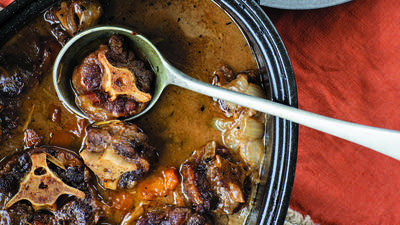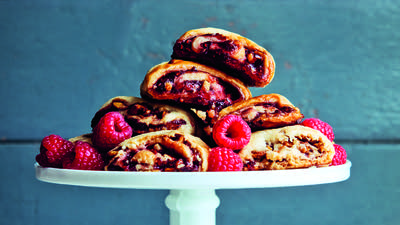
The next time you get home from the farmers market with bagfuls of strawberries, bell peppers and fennel, head straight to the liquor cabinet instead of the fridge. Andrew Schloss, the author of Homemade Liqueurs and Infused Spirits, says fresh fruit, vegetables and herbs can be transformed into amazing-tasting liqueurs that are perfect for the summer cocktail season.
Noelle Carter: You talk about the rise of home brewing and home winemaking, and how that has given rise to homemade liqueurs. The thing that’s so cool about homemade liqueurs is that they’re so much easier than homemade beer or wine in that you don’t need any special equipment or ingredients.
 Andrew Schloss
Andrew Schloss
Andrew Schloss: That’s exactly right. The other thing about them is that you get really clean flavors. Because the liquor you’re using is already distilled (since home distillation is not legal in the U.S.), you’re getting really fresh flavors.
If I take strawberries and I make strawberry wine, it doesn’t really taste a lot like strawberry anymore. But if I take those strawberries and infuse them into some vodka with a little bit of sugar, I get this really fresh, authentic, strawberry flavor.
NC: This comes together, and you know within a week whether or not you have something that’s really good.
AS: Absolutely. You don’t have to take months to ferment and to age something. As soon as the flavors from the fruit, herb, vegetable or whatever you’re infusing are into the alcohol, it’s done.
It depends on what you’re infusing. If I’m doing something really pungent, like a black pepper liqueur or a horseradish liqueur, that’s going to infuse into the alcohol in about an hour or two. If I’m doing something like fresh strawberries, that might take 5 days. If I’m doing something like dried peaches, that might take 3 days because the peaches are dried, they’re more concentrated.
NC: When I think of homemade liqueurs or when I think of liqueurs in general, I always tend to think of them as something that you would enjoy on a chilly evening, something more winter oriented. But so many of the recipes in your book are seasonal in that they call for fresh fruits or vegetables. It’s amazing how many of these liqueurs are perfect for summer.
 Schloss' recipe: Sweet-Pepper Surprise
Schloss' recipe: Sweet-Pepper Surprise
AS: Absolutely. The thing about old-style liqueurs is that they started as medicinals. They were frequently recipes that had 60, 80 ingredients in them, very complex combinations of flavors. They were highly sugared to make them syrupy. I think that’s why we associate them with cooler weather or hardier kinds of things.
But the fact is when I’m tincturing anything into alcohol, I can get a really fresh flavor. I can also control the sugar. I don’t need a lot of sugar to make the flavors of the fruit, the herb or the vegetable come out. Alcohol has this amazing ability to bond onto other molecules.
If I’m cooking with garlic and I sauté it, I’m going to get this pungent garlic flavor. That flavor is an aroma, and aromas are only perceived through oil in the nose. If I boil that garlic, I’m going to get more sweetness because the sugar in it is going to come out. I don’t have an oil that will carry the garlic flavor into my system, so I don’t perceive it. If I put that garlic into alcohol, both the sugar and the garlicky aromas get attached to the alcohol, so I get this full-bodied flavor all at once.
NC: You have a couple of cocktails that seem perfect for the season. I recently tried your grapefruit tonic, and it was amazing.
 Homemade Liqueurs and Infused Spirits
Homemade Liqueurs and Infused Spirits
AS: Grapefruit is one of my favorite citruses. One of the things I like in citrus fruit is the flavor of the peel. The peel contains bitter alkaloids that are healthy for you. I’m a big fan of bitterness when it is counteracted with all the other mouth flavors, with sour, sweet and salty. I work with bitterness a lot; I think it’s an interesting thing.
Grapefruit is one of the only citruses that still retains some bitterness in its peel. When you put a grapefruit peel into vodka or any kind of alcohol, you’re going to get a little bit of bitterness to it. Tonics are also a bitter, helpful beverage. They’re made from cinchona bark, which has a lot of these alkaloids in it.
I combine the bitterness of the grapefruit and the bitterness of the cinchona, put it into vodka and then just let it sit for about a week. You put some sugar in there too to get some sweetness. You get this really tangy, fruity, bitter, sweet thing. You get this liqueur that all you have to do is add a spark of seltzer to it, and you get this citrusy gin and tonic when you’re done.
NC: I’m a big strawberry fan. You have a few really, really tempting strawberry liqueur recipes. Do you have a favorite?
 Schloss' recipe: In Praise of Fraise
Schloss' recipe: In Praise of Fraise
AS: The ones that I like the best are the straightforward ones. There’s one called In Praise of Fraise, which is just some strawberries, simple syrup and vodka. They’re just put together, they sit together for about a week, you strain it out, and you get this elixir, this liquid that is the pure essence of strawberries. If you have ripe strawberries right now, you put them into vodka, and all of that ripe flavor goes into the alcohol and stays there. A year later it’s still there as if you’d just picked that strawberry.
NC: These recipes, so many of them are so simple, they only call for a few ingredients. You can make a run to your regular grocery store and you’ve got the makings of a great gift or a great cocktail idea for summer entertaining.
AS: They’re beautiful too. The strawberry rum we were just talking about is this gorgeous ruby color because the color also gets trapped by the alcohol. It’s like no work, and you have this amazing-tasting and amazing-looking thing.
NC: When you think homemade liqueurs are infusing alcohols, I’ve always thought of using a neutral spirit, something like a vodka. But so many of the recipes that you use call for richer liquors like brandies. You even use wines in some of the recipes.
 Schloss' recipe: Blueberry Cinnamon
Schloss' recipe: Blueberry Cinnamon
AS: You want the neutral spirit when you don’t want to have any other flavors there other than the solid ingredient that you’re infusing into the liqueur.
But when I make apple liqueurs, I frequently use a cognac or a bourbon because the caramely flavors in those brown liquors work very well with apple, pear and cinnamon flavors. If I’m doing herbal or spicy liqueurs, starting with a brown liquor gives you that head start. You also add that vanilla flavor from the aging and wood.
Tequilas are amazing with vegetable flavors, so I do a lot of bell pepper, chile pepper, fennel and that kind of thing with tequila.
Rum is wonderful with tropical fruits like mango, pineapple and those kinds of flavors.
Before you go...
Each week, The Splendid Table brings you stories that expand your world view, inspire you to try something new and show how food brings us together. We rely on you to do this. And, when you donate, you'll become a member of The Splendid Table Co-op. It's a community of like-minded individuals who love good food, good conversation and kitchen companionship. Splendid Table Co-op members will get exclusive content each month and have special opportunities for connecting with The Splendid Table team.
Donate today for as little as $5.00 a month. Your gift only takes a few minutes and has a lasting impact on The Splendid Table and you'll be welcomed into The Splendid Table Co-op.





